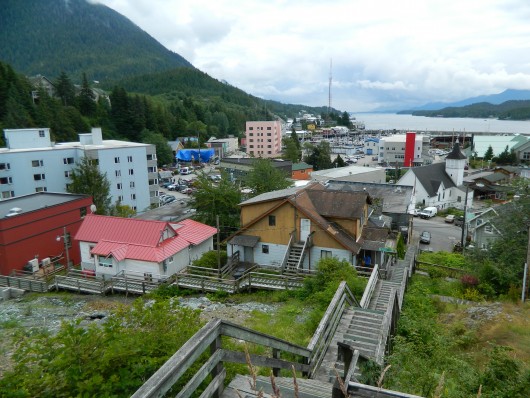The Ketchikan City Council backtracked Thursday on a move toward metered rates for fish processing plants, approved a 100-percent design contract for an adjustment to the new water treatment plant; and approved a 5-percent budget cut to almost all city departments.
Fish processors use a lot of water, and a rate study commissioned by the City of Ketchikan shows that residential customers heavily subsidize that industry’s water use.
There has been a push to get fish processors onto a metered rate system, rather than a flat-rate, and to start increasing their rates in hopes of getting their fees closer to their actual use. The processors naturally pushed back, arguing that their industry helps diversify the local economy and provides year-round jobs in a community that heavily relies on the seasonal tourism industry.
Last year, the Council decided to not get into metering yet, and raised rates for everyone, residential, commercial, heavy industrial, by 8 percent. Council members at the time said they planned to repeat that for three years. So, when the city proposed a different plan that raised everyone 4 percent, but then added an extra metered charge for fish processors that was quite a bit higher than 8 percent, well. It didn’t fly.
The Council changed that proposal, directing management to bring back a new ordinance raising rates for everyone by 4 percent, and a metered charge for fish processors that brought them up to the equivalent of 8 percent more.
The processors still didn’t like it. And the Council again decided to change it. After much debate, members directed management to increase rates by 4 percent for everyone except fish processors. The processors will get an 8 percent increase. No metering.
Here’s Council Member Judy Zenge. “I agree that we do at some point have to get to a metered schedule for industrial users, but I just don’t think what we did was fair and allowed them the time to make their changes.”
City Manager Karl Amylon noted that if the motion is eventually adopted, it will leave the utility about $150,000 behind where the Council wanted it.
A 4-percent increase for residential customers will mean an increase of nearly $2 each month, from $46.34 to $48.19.
The Council also approved an 8-percent increase to wastewater rates. For residential customers, the monthly bill will go up $3.43, from $42.85 to $46.28.
The 5-percent budget cut to all city departments was adjusted slightly by the Council before it was adopted. Council Member DeAnn Karlson proposed two amendments to add back about $18,000 for community nonprofit grants, and about $14,600 for the Ketchikan Public Library. The library director earlier suggested that adding back Sunday hours already had stretched the library budget too thin.
Both amendments passed. The amended main motion also passed, with Council Members Dave Kiffer and Matt Olsen voting no.
Olsen said he believes the city department heads likely will come back in the fall asking for money to pay for the items they just cut. And Kiffer said he doesn’t like the “meat cleaver” approach to cutting budgets.
“If we want to cut something, cut it. Rather than just say let’s just do this 5 percent thing across the board,” he said. “I would rather see us take that action rather than pass it off onto staff.”
The Council also voted unanimously in favor of a contract with consultants CH2M-Hill to complete the design for the planned adjustment to the city’s new water treatment plant.
The new plant combines chloramination with UV light to disinfect water, and was built to reduce the byproducts created with chlorine-only disinfection. Chloramine is a combination of chlorine and ammonia.
The new system didn’t reduce those byproducts enough, and the city is now working on an adjustment to that system in hopes of bringing the levels down below federal requirements.
Floyd Damron of CH2M-Hill explained how the adjustment will work. He said chlorine will be added to the water twice. But, because of when it’s added to the water, Damron said the system will use less chlorine, leading to fewer byproducts.
“That much-lower dose of chlorine will be going through the UV reactors, and immediately downstream of the reactors, new chlorine is added. The total dose of those two, will be less than the single dose that it’s putting in now,” he said. “That should help offset the operating costs of heating the building, lights and whatever. So the overall operating costs for KPU of this building should be a wash.”
The final-design contract will cost the city an additional $329,000. The initial design phase cost $75,000.
The 35-percent design report estimates that the adjustment will cost about $1.4 million to construct.
Thursday’s meeting had been rescheduled from Jan. 1 because of the New Year’s Day holiday. The next Ketchikan City Council meeting is next Thursday, Jan. 15.






